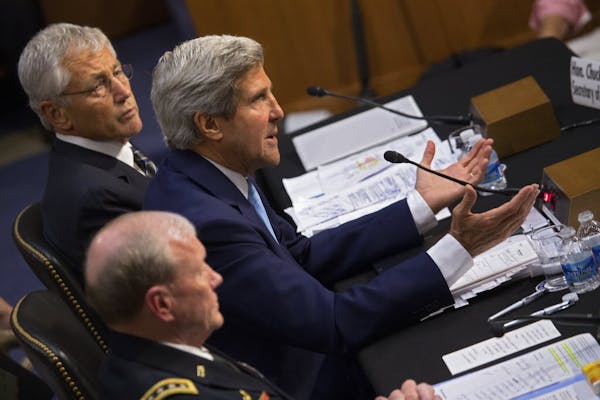As Congress prepares to debate how to respond to Syria's alleged use of chemical weapons, Minnesotans on Monday seemed both resigned to the need to punish the Assad regime and weary of the prospect of military retaliation — but skeptical that it would make much difference anyway.
About the only thing that people agreed on was that the situation was piled high with difficulty and that President Obama was right to seek congressional authorization for a military strike.
"I'm really tired of the wars," said Sue Smith of Minneapolis, taking a breather at the State Fair. "You can't allow the slaughter of innocent people, but I think other sanctions besides military action would be in order. Something with trade."
On the other hand, said Raed Rizq, a Palestinian native who lives in Maple Grove, Obama "needs to respond with an appropriate level of force and show that they can't get away with it, and prevent them from trying to do it again. …
"Even if [Congress says] no, he should act."
The United States is considering launching a punitive strike against the regime of Syrian President Bashar Assad, blamed by the United States and the Syrian opposition for an Aug. 21 alleged chemical weapons attack in a rebel-held suburb of the Syrian capital of Damascus.
The United States says the attack killed 1,429 people, including at least 426 children. Those numbers are significantly higher than the death toll of 355 provided by the aid group Doctors Without Borders.
Obama, after first signaling that the U.S. military would strike Syria within days of the attack, has decided to let Congress vote on the matter.
Before Obama announced that decision Saturday, an NBC News Poll released Friday indicated that Americans were more open to limited airstrikes against Syria than to broader military action.
Whatever action the president took, however, nearly 80 percent of Americans believed that he should first get congressional approval, the poll found.
Despite the general opposition to involvement, 50 percent support using military force if it were limited to missiles from U.S. naval ships aimed at military forces and the infrastructure used to carry out chemical weapons attacks, while 44 percent oppose this move, the poll found.
A difficult decision
Fran Ankel, a Minneapolis nurse, strolling the fair with health educator Grit Youngquist of St. Paul, said she was torn over what to do. Ankel, who toured Syria and the Middle East two years ago, said there is no easy answer.
"If it was me getting gassed, I'd want someone to help me. On the other hand, whether you're gassed or you're bombed, you're dead," she said.
Ankel also wondered about the motives behind a strike. "It's hard to know how much is saving face, because [Obama] talked about the red line [of chemical weapons] … I don't think we should do it on that basis," she said.
Youngquist said she's finding herself swayed by arguments that airstrikes wouldn't do much to change the regime's tactics. She'd also like to know more about what Syrians think about retaliation by the West, she said.
"I'd prefer to see us do anything other than take direct action," she said.
Several people expressed similar wariness over military action of any kind — and no one supported action involving troops.
"I think we spend too much time in other countries when we have so many big issues here," said Richmond Clark of Mankato, seeing the fair with his two sons.
"We don't need to get involved in the Middle East … who do we attack? There's evidence that there were chemical weapons, but whose were they? Assad's or the rebels'?" said Bob Gibson of Columbia Heights.
"We should try to negotiate it, talk it through, see if there's an alternative to military action," said Eli Hallman, a student at Alden-Conger High School in Alden, Minn.
Nathan Grossman of Lakeville said something should be done, perhaps along the lines of a missile strike, to stop Syria from "let[ting] their people run wild and kill their own countrymen."
He added that it was smart for Obama to consult Congress, a view that many expressed.
"That is a good idea, to get everybody's opinion on it and get all the right information," Grossman said.
"One man should not have the power to do it," said David Kent, a Pentecostal pastor in Golden Valley. "The situation in Syria is difficult, and I think it does need to go before Congress."
"I think that the more people involved [in the decision], the better," said Andrea Volbrecht of Woodbury. "We're so divided on everything, it will help."
Kevin Duchschere • 651-925-5035

University of Minnesota police arrest 9 after pro-Palestinian encampment set up on campus
2 dead in Lino Lakes, no known threat to public, police say
Teen charged with murder in deadly St. Paul shooting last month

